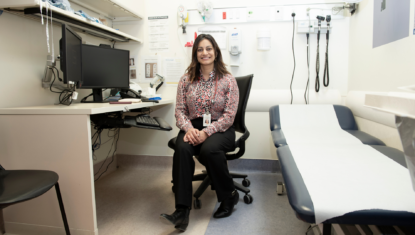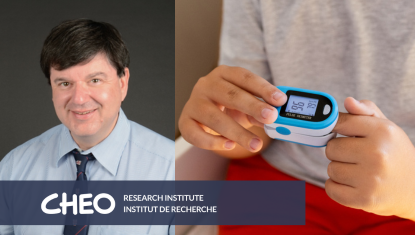Asthma is the most prevalent chronic disease of childhood. Asthma research at CHEO address all aspects, from the basic science to providing the most up-to-date therapy in the most efficient way in the emergency department, to innovative care for children admitted to the in-patient wards and ways to best communicate discharge instructions in order to prevent future attacks.
Researchers in the emergency department (ED) are studying the science of why some children respond differently to oral steroids used to treat a severe asthma attack. Researchers are looking at virus exposure, genetic, lung inflammation, and exposure to second-hand smoke as possible explanations.
CHEO emergency department researchers have shown that nurse-initiated steroids for more severe asthma attacks lead to better efficiency, with resulting shorter ED stays and fewer admissions.
Patients admitted to the in-patient units with asthma are being managed using an innovative scoring system, which is being evaluated for efficiency.
CHEO has won provincial and national awards for developing a novel discharge plan that combines discharge instructions with prescription information.
Related News
-

03/07/2024
Using AI to predict which kids are at risk of repeat visits to the emergency for asthma and redirecting them to specialized care
-

16/01/2024
Commercial pediatric fingertip devices and smartphone applications used to measure oxygen saturation not recommended for infants
-

22/12/2022
CHEO Research Institute 2022 Awards of Excellence
Research Projects
-
Effect of Nebulized Magnesium vs Placebo Added to Albuterol on Hospitalization Among Children With Refractory Acute Asthma Treated in the Emergency Department: A Randomized Clinical Trial
24/11/2020
Among children with refractory acute asthma in the emergency department, nebulized magnesium with albuterol, compared with placebo with albuterol, did not significantly decrease the hospitalization rate for asthma within 24 hours. The findings do not support use of nebulized magnesium with albuterol among children with refractory acute asthma.
-
Predictors of future acute asthma visits among children receiving guideline recommended emergency department discharge management
23/04/2020
This retrospective cohort study that shows that even if children receive an asthma action plan or prescription for inhaled steroids after a tertiary care ED asthma visit, youth with a peanut allergy, with high severity symptoms at presentation, and a prior asthma diagnosis are most likely to return to the ED.
-
Does Respiratory Syncytial Virus Lower Respiratory Illness in Early Life Cause Recurrent Wheeze of Early Childhood and Asthma? Critical Review of the Evidence and Guidance for Future Studies From a World Health Organization-sponsored Meeting
01/03/2020
Many observational studies have found an association between RSV LRTI in early life and subsequent respiratory morbidity, including recurrent wheeze of early childhood (RWEC) and asthma.
-
Health outcomes of young children born to mothers who received 2009 pandemic H1N1 influenza vaccination during pregnancy: retrospective cohort study
01/07/2019
Pregnant women are considered to be at high risk for serious illness due to influenza related mortality and morbidity documented during influenza pandemics and seasonal epidemics. No associations were observed between exposure to pH1N1 influenza vaccine during pregnancy and most five year pediatric health outcomes.
-
Pharmacotherapy in bronchiolitis at discharge from emergency departments within the Pediatric Emergency Research Networks: a retrospective analysis
01/06/2019
Use of ineffective medications in infants with bronchiolitis at discharge from emergency departments is common, with large differences in prescribing practices between countries and emergency departments. Enhanced knowledge translation and deprescribing efforts are needed to optimise and unify the management of bronchiolitis.
-
Emergency department visit count: a practical tool to predict asthma hospitalization in children
01/06/2019
We identified 2669 patients with 3300 asthma ED visits. ED visit count was an independent predictor of future hospitalization risk (p < 0.001), demonstrating a dose-dependent response.
-
Genetic determinants of acute asthma therapy response in children with moderate‐to‐severe asthma exacerbations
01/01/2019
We aim to determine single nucleotide polymorphisms (SNP) associated with emergency department (ED) management failure in children.
-
Generational Patterns of Asthma Incidence among Immigrants to Canada over Two Decades. A Population-based Cohort Study
01/03/2018
Incidence of asthma was compared between immigrants from different regions of the world and long-term Ontario residents and their children, with the aim of providing further insight into the influence of environmental exposures on the development of asthma.
-
Existence, Functional Impairment, and Lung Repair Potential of Endothelial Colony-Forming Cells in Oxygen-Induced Arrested Alveolar Growth
01/05/2014
We show for the first time that ECFCs exist in the distal vasculature of the developing mammalian lung, and their functional capacity is impaired in oxygen-induced lung damage. We also show that therapeutic supplementation with human umbilical cord blood–derived ECFCs is feasible, efficacious, and apparently safe in this experimental O2-induced model of BPD in neonatal mice.
-
Long-term respiratory complications of congenital esophageal atresia with or without tracheoesophageal fistula: an update
03/06/2013
Recent studies suggest that in older patients, respiratory symptoms tend to be associated with atopy, but abnormal lung function tends to be associated with gastroesophageal reflux and with chest wall abnormalities.
-
Airway Delivery of Mesenchymal Stem Cells Prevents Arrested Alveolar Growth in Neonatal Lung Injury in Rats
01/12/2009
MSC treatment preserved alveolar structure in a model of chronic lung disease in newborn rats caused by severe hyperoxia, which may be due to a paracrine effect on lung cells. MSCs may have therapeutic potential for preventing neonatal lung diseases characterized by alveolar damage.
Researchers
-
Deshayne Fell
Affiliate Investigator, CHEO Research Institute
-
Tom Kovesi
Investigator, CHEO Research Institute
-
Eric LaCasse
Associate Scientist, CHEO Research Institute
-
Amy Plint
Senior Scientist, CHEO Research Institute
-
Dhenuka Radhakrishnan
Scientist, CHEO Research Institute
-
Bernard Thébaud
Senior Scientist, CHEO Research Institute
-
Roger Zemek
Senior Scientist, CHEO Research Institute







